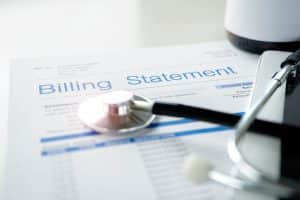What Are Economic Damages, Exactly?
 When you’re hurt because of someone else’s actions, you can see compensation for your losses. In Illinois, this is called compensatory, or actual, damages. There are two types of compensatory damages: economic, and non-economic.
When you’re hurt because of someone else’s actions, you can see compensation for your losses. In Illinois, this is called compensatory, or actual, damages. There are two types of compensatory damages: economic, and non-economic.
Under the law, “‘Economic loss’ or ‘economic damages’ means all damages which are tangible, such as damages for past and future medical expenses, loss of income or earnings and other property loss.” Think of these damages as the ones that come with receipts – literally. Most folks think this is limited to their hospital bills, wages from days missed at work, and car repairs (if applicable), but economic damages can actually cover so much more.
Let’s start with the three types specifically mentioned in the law.
Medical expenses
Medical expenses encompass a broad spectrum of costs associated with healthcare services and treatments aimed at preserving or improving an individual’s health. These include fees for doctor visits, hospital services, prescription medications, diagnostic tests, dental and vision care, mental health services, rehabilitation, medical equipment and supplies, home healthcare, and transportation for medical care. Essentially, any expenditure related to your healthcare and wellbeing falls under the category of medical expenses.
Future medical expenses
An injured victim can also seek recovery for future medical expenses reasonably certain to incur, such as a future surgery, physical therapy, or basic office visits.
Lost earnings
Lost earnings refer to the income and financial advantages an individual would have earned if not for the harm caused by the negligent party. These damages seek to reimburse the plaintiff for the actual income lost during their recovery or inability to work, including potential future earnings impacted by sustained injuries. The elements of lost earnings cover current lost income, comprising wages, salary, bonuses, and other compensation lost during the recovery period. Benefits and perks, such as health insurance or retirement contributions, may also factor into the calculation of lost earnings. Determining these damages involves assessing pre-injury earning history, employment status, job prospects, and the projected impact of injuries on your ability to work again.
Future earnings
This compensation seeks to address the financial repercussions associated with a diminished capacity to work and generate income. Considerations in assessing future earnings encompass the individual’s occupational background, educational qualifications, work history, employability, life expectancy, and economic factors like inflation and the cost of living.
Calculating future earnings is a nuanced process, requiring a comprehensive evaluation of various factors that influence an individual’s earning potential. By accounting for career trajectories, employability challenges, and economic dynamics, the goal is to provide equitable compensation that acknowledges the extended financial consequences of the harm suffered. In legal proceedings, the presentation of a compelling case for future earnings relies on meticulous documentation and expert testimony to support the estimated economic impact and secure fair restitution for the affected party.
Property damage
Along with the costs associated with your medical care (and lost wages), you can also seek compensation for any property loss. In a car accident, for example, that includes things like car repairs, broken cell phones, damaged clothing, and other tangible losses.
What other types of economic losses can I claim in a personal injury lawsuit?
There are other financial considerations, especially for victims of serious or life-changing injuries, that the laws don’t outline specifically. But just because they’re not named doesn’t mean you can’t seek compensation for them.
Funeral expenses and burial costs
If your loved one dies, you can seek compensation for the associated costs. Funeral expenses encompass a spectrum of charges, including fees for funeral services, the purchase of caskets or urns, burial or cremation costs, transportation expenses, memorial materials, floral arrangements, and miscellaneous items like death certificates and legal fees.
Home renovations and modifications
Some catastrophic injuries require much more than medical care. One significant aspect is the cost of accessibility modifications to homes or vehicles, ensuring that living spaces are suitable for individuals with mobility challenges. These modifications may include:
- Wheelchair ramps, widened doorways, lowered countertops, or specialized bedroom and bathroom fixtures for paralysis victims
- HEPA air filters and specialized climate control systems for burn injury victims
- Non-slip flooring and tactile labels/markers for folks with vision loss
- Wheelchair accessible vans with specialized lifts/ cars with hand-powered gas and brakes
Professional services
You can also seek compensation for costs associated with daily life that have nothing to do with your medical bills. We’re calling them “professional services” because you’ll have to hire someone to perform them. The more common services include:
- House cleaners
- Dog walkers
- Transportation services
- Childcare
- Tutors/private teachers
Note that some of these needs may not be permanent. You may not need permanent childcare or a permanent dog walker if you eventually heal from your injuries. You may only need to use the bus or a taxi/rideshare for a few months. You can still list these expenses as part of your claim, because you would not have incurred them had you not been injured.
The other damages available in a Chicago personal injury case
We focused on economic damages, but there are two other types of damages that can you may be able to seek:
- Non-economic damages. This is the other type of compensatory damage, and it covers the non-tangibles: pain and suffering, loss of enjoyment of life, loss of consortium, disability or disfigurement, increased risk of future harm, and mental and physical anguish.
- Punitive damages. These are damages designed to punish wrongdoers for especially egregious acts of negligent or reckless behavior. They don’t always apply in personal injury cases.
Gainsberg Law’s experienced Chicago personal injury attorneys are dedicated to helping individuals secure the compensation they deserve. From medical expenses to lost income and property damage, we thoroughly assess all aspects of economic losses, aiming not only to address immediate financial burdens but also to consider the long-term impact on earning capacity. If you are looking to file a personal injury lawsuit, Gainsberg Law can help. To schedule a free consultation to discuss your options, call us at our Chicago office, or use our contact page. We proudly serve those throughout Cook County.

Attorney Neal Gainsberg has spent the last 20+ years fighting to protect the rights of the injured in Chicago and throughout Illinois. For dedicated legal help with a personal injury, car accident, or wrongful death matter, contact Gainsberg Injury and Accident Lawyers in Chicago for a free consultation.
